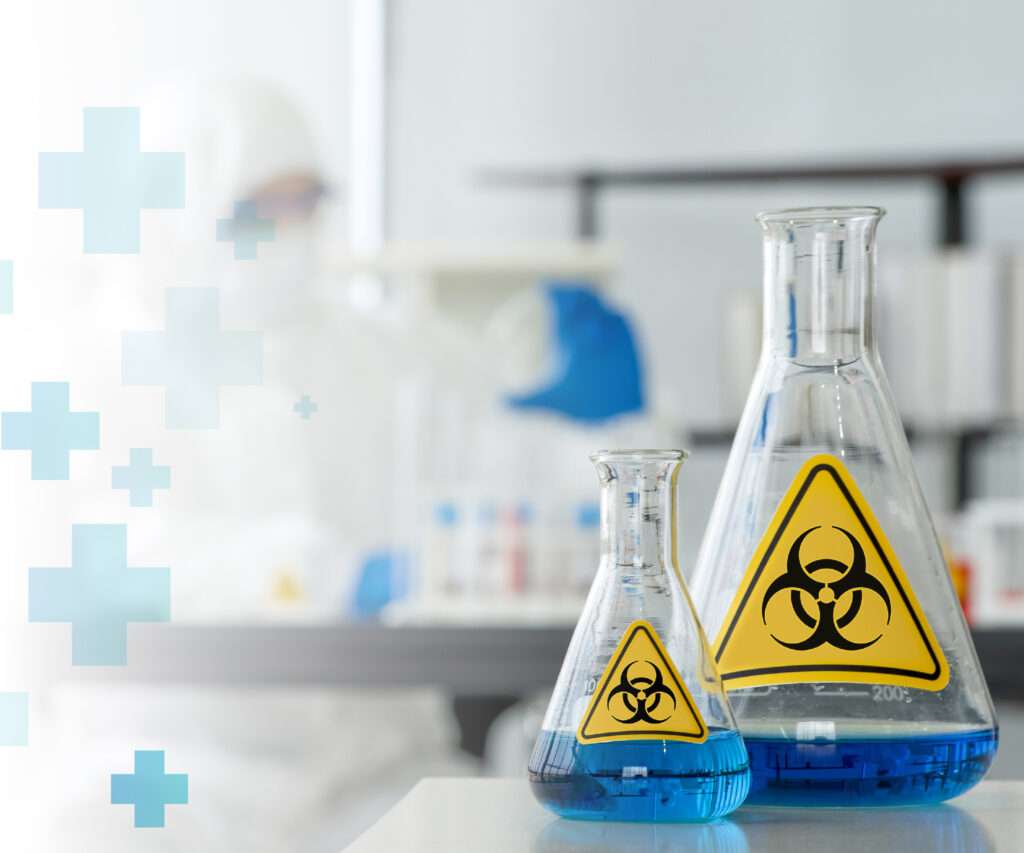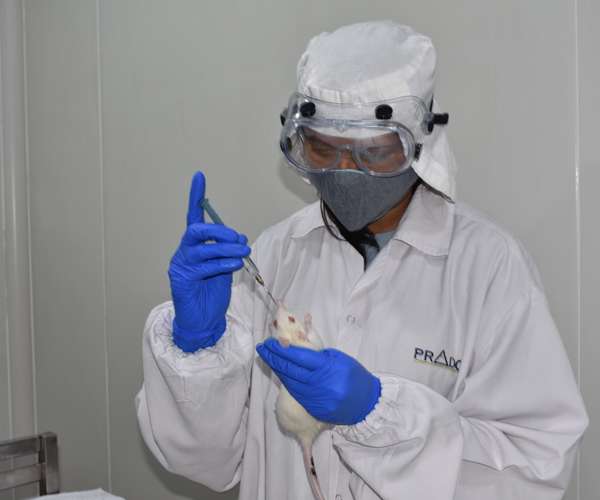In-vitro Genotoxicity

What is Toxicology ?
The process of development of new healthcare products is designed to ensure that the innovative products are effective, safe and available to the patients in a shortest possible time. Safety evaluation of new healthcare products is identifying its potential to exert a harmful effect on human, animal or environment. These safety tests provide crucial information for planning human trials and are required by law to be tested on animals and other test systems.
PRADO has expertise to conduct GLP toxicity studies such as Systemic Toxicity, Genetic Toxicity, Reproductive Toxicity, Discovery and Risk Assessment required by the Pharmaceutical, Biotech and Biopharma, Vaccine, Food, Agrochemical and Medical Device Companies for their regulatory submissions, as well as to ensure that their products are effective and safe.
- Reverse Mutation Assay (Ames Assay)
1.Mini Ames – Using 2 or 3 strains of
Salmonella Typhimurium.
2.Full Ames- Using all 5 strains of
Salmonella Typhimurium. - Micronucleus Test (MNT)
1. In Vitro Mammalian Cell Micronucleus Test - Chromosomal Aberration Assay
1. In Vitro Mammalian Chromosomal
Aberration Test - Gene mutation assays
- Acute Toxicity Studies
1. Single-Dose Toxicity Study in Rodent Models by Various Routes.
2. Acute Eye Irritation Study in Rabbits.
3. Acute Dermal Toxicity Study in Rats or Rabbits.
4. Acute Skin Sensitization Study in Rabbits.
5. Skin Sensitization Study in Guinea Pig (GPMT).
6. Acute Systemic Toxicity Study in Mice - Repeated Dose Toxicity Studies (Rodent and Non-rodent)
1. 7-14-Days Repeat Dose Toxicity Study.
2. 28-Day Repeat Dose Toxicity Study.
3. 90-Day Repeat Dose Toxicity Study.
4. 180-Day Chronic Toxicity Study.
5. Carcinogenicity Study in Rodents. - Developmental & Reproductive Toxicology
1. Embryo Foetal Development Study in Rat and Rabbits.
2. Male and Female Fertility Study in Rodents.
3. One and Two Generation Reproductive Toxicity Studies in Rodents. - Genetic Toxicity Studies
1. Micronucleus Test (MNT).
• In-Vivo Mammalian Erythrocyte Micronucleus Test in Mice.
2. Chromosomal Aberration Assay
• In-Vivo Mammalian Bone Marrow Chromosome Aberration Test - Immunogenicity Studies for Vaccines
● Approved Species– Rat, Mice, Rabbit, Guinea Pig, (mini pig and Dog 3rd Party Collaboration)
● Routes– Intra Venus (IV), Intra Muscular (IM), Intra Peritoneum(IP), Sub-cut, Intra-nasal, Sub-conjunctival, Dermal, Intra-articular, Ocular.
What is Toxicology ?
The process of development of new healthcare products is designed to ensure that the innovative products are effective, safe and available to the patients in a shortest possible time. Safety evaluation of new healthcare products is identifying its potential to exert a harmful effect on human, animal or environment. These safety tests provide crucial information for planning human trials and are required by law to be tested on animals and other test systems.
PRADO has expertise to conduct GLP toxicity studies such as Systemic Toxicity, Genetic Toxicity, Reproductive Toxicity, Discovery and Risk Assessment required by the Pharmaceutical, Biotech and Biopharma, Vaccine, Food, Agrochemical and Medical Device Companies for their regulatory submissions, as well as to ensure that their products are effective and safe.

- Approved Species– Rat, Mice, Rabbit, Guinea Pig, (mini pig and Dog 3rd Party Collaboration)
- Routes– Intra Venus (IV), Intra Muscular (IM), Intra Peritoneum(IP), Sub-cut, Intra-nasal, Sub-conjunctival, Dermal, Intra-articular, Ocular.

What is In-vitro Genotoxicity ?
The process of development of new healthcare products is designed to ensure that the innovative products are effective, safe and available to the patients in a shortest possible time. Safety evaluation of new healthcare products is identifying its potential to exert a harmful effect on human, animal or environment. These safety tests provide crucial information for planning human trials and are required by law to be tested on animals and other test systems.
PRADO has expertise to conduct GLP toxicity studies such as Systemic Toxicity, Genetic Toxicity, Reproductive Toxicity, Discovery and Risk Assessment required by the Pharmaceutical, Biotech and Biopharma, Vaccine, Food, Agrochemical and Medical Device Companies for their regulatory submissions, as well as to ensure that their products are effective and safe.
- Approved Species– Rat, Mice, Rabbit, Guinea Pig, (mini pig and Dog 3rd Party Collaboration)
- Routes– Intra Venus (IV), Intra Muscular (IM), Intra Peritoneum(IP), Sub-cut, Intra-nasal, Sub-conjunctival, Dermal, Intra-articular, Ocular.
Information Technology
- 1.Mini Ames – Using 2 or 3 strains of
Salmonella Typhimurium.
2.Full Ames- Using all 5 strains of
Salmonella Typhimurium.
1. In Vitro Mammalian Cell Micronucleus Test
1. In Vitro Mammalian Chromosomal
Aberration Test
In-vivo – Toxicity
- Single-Dose Toxicity Study in Rodent Models by Various Routes.
2. Acute Eye Irritation Study in Rabbits.
3. Acute Dermal Toxicity Study in Rats or Rabbits.
4. Acute Skin Sensitization Study in Rabbits.
5. Skin Sensitization Study in Guinea Pig (GPMT).
6. Acute Systemic Toxicity Study in Mice
- 7-14-Days Repeat Dose Toxicity Study.
2. 28-Day Repeat Dose Toxicity Study.
3. 90-Day Repeat Dose Toxicity Study.
4. 180-Day Chronic Toxicity Study.
5. Carcinogenicity Study in Rodents.
- Embryo Foetal Development Study in Rat and Rabbits.
2. Male and Female Fertility Study in Rodents.
3. One and Two Generation Reproductive Toxicity Studies in Rodents.
- Micronucleus Test (MNT).
• In-Vivo Mammalian Erythrocyte Micronucleus Test in Mice.
2. Chromosomal Aberration Assay
• In-Vivo Mammalian Bone Marrow Chromosome Aberration Test
